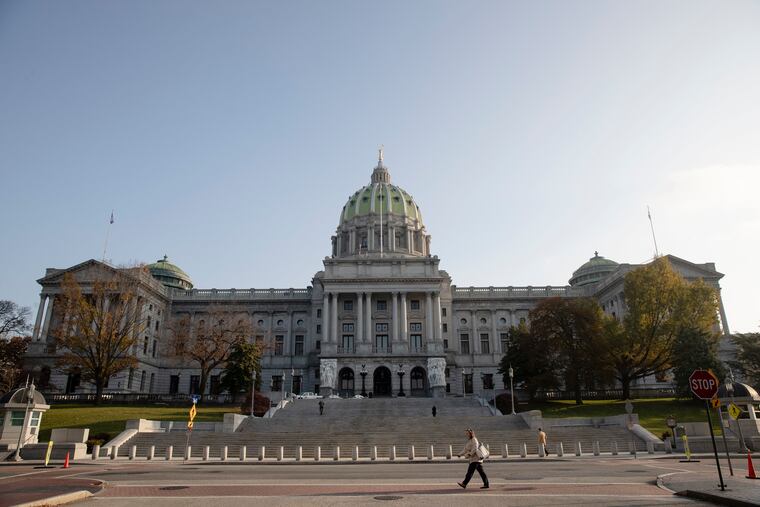To improve coronavirus response, Pa. needs to fix gaps in law — and fast | Editorial
When the state House and Senate reconvene on Monday, the first thing on the agenda should be passing a slew of bills to facilitate Pennsylvania’s ability to mitigate the spread of the coronavirus.

This week, the World Health Organization declared coronavirus a pandemic, Philadelphia announced its first confirmed case, and New Jersey had a first patient die. Meanwhile, countries around the world, like South Korea and China, are controlling the spread through mass testing (for coronavirus and fever) and extreme social distancing. Other places, like Japan, provide assistance for people who cannot work.
Pennsylvania’s state laws, unfortunately, make it hard for the commonwealth to follow what seems to work in other places. Harrisburg lawmakers are not known for accomplishing big things for the public good in a bipartisan manner. Considering the urgent need for action, when the state House and Senate reconvene on Monday, the first thing on the agenda should be passing a slew of bills to facilitate Pennsylvania’s ability to mitigate the spread of the coronavirus.
Provide more data on testing and cases
Clear and accurate information is more important than ever in a time of a health crisis. Last week, Spotlight PA reported that because of a 1955 law, the Pennsylvania Department of Health has an impenetrable shield that keeps them from releasing details about coronavirus cases — including the number of people tested, the number under quarantine, the ages of those testing positive, or the municipalities where cases were confirmed.
When a woman tested positive for coronavirus in Delaware County, the Health Department would not disclose in which municipality she was located, frustrating both residents and county representatives — and setting a bad precedent for keeping the public informed. State Sens. Tim Kearney (D., Delaware) and Tom Killion (R., Delaware) sent the Department of Health a letter calling for more transparency. In the absence of official information, speculation rose on social media.
After the Spotlight PA story, the Department of Health published a website with the overall number of people tested in Pennsylvania. It still falls short of the kind of information the public needs.
Striking a balance between protection and transparency is difficult. But there are clear ways for this law to be overhauled (a Joint State Government Commission proposed a rewritten law in 2013 providing more leniency on releasing unidentified data). Legislators should define what data is necessary for local officials and the public to respond to the coronavirus, and require the Department of Health to release it. Tallies of tests with results, the number of people quarantined by county, and the municipality where tests are confirmed should not threaten privacy and would improve local response.
» READ MORE: Pennsylvania isn’t releasing details on coronavirus cases because of a decades-old law
» READ MORE: Pennsylvania’s health department is keeping coronavirus details from local officials
Support isolation and quarantine
Social distancing is the correct coronavirus response. That includes 14 days of isolation for people who are ill or quarantine for people who were potentially exposed to the virus.
Rebecca Katz, director of the Center for Global Health Science and Security at Georgetown University, says that isolation and quarantine should be thought of as similar to jury duty: an inconvenience that citizens participate in out of social responsibility. State law protects jurors from loss of employment due to the time they missed. Pa.’s isolation and quarantine law, however, does not offer any employment protection — even though it is for the greater good.
Last week, State Sen. Steven J. Santarsiero (D., Bucks) introduced a cosponsorship memorandum for a bill that would provide employment protections during times of public health emergencies. The bill, still being drafted, would give employees job security even if they don’t have sick leave — an important step to protect workers acting in the benefit of the public’s good.
» READ MORE: A Pennsylvania couple were celebrating their anniversary. Then coronavirus broke out on the cruise ship.
Other changes to help low-income people
Low incomes create major barriers to social distancing. The state should act to remove as many barriers as possible.
State law prevents state regulated utilities — PGW and PECO in Philadelphia — from shutting off service for low-income costumers between Dec. 1 and March 31. The moratorium needs to be extended until the quarantine recommendation is removed.
The Low Income Home Energy Assistance Program (LIHEAP) provides low-income families with grants to pay their utility bills. The program should be extended this year beyond the April 10 cutoff. In previous years, the program ended the season with leftover funds. That should allow for an extension without new appropriations.
Last year, the General Assembly killed the General Assistance program that helped some 10,000 people cover basic needs by providing $200 monthly checks. A mechanism like General Assistance to administer small cash grants could help people to stay at home during this pandemic.
Twelve states and D.C. have enacted paid sick leave policies. Pennsylvania is not one of them. The state should enact a paid leave policy immediately.
The coronavirus crisis is an opportunity for lawmakers to find common ground and prove it can take swift action for the common good.